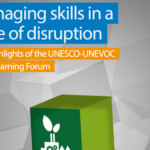The landscape of Technical and Vocational Education and Training (TVET) in South Africa is in a state of transformation. Despite extensive macro-level changes over the past fifteen years, including policy reforms and structural adjustments, the sector grapples with significant challenges. Central to these challenges is the academic and professional preparedness of TVET college lecturers, who operate within an environment of uncertainty and instability. Based on a study by Neville Rudman and Leslie Meiring from Nelson Mandela University, this article explores the impact of a professional development programme grounded in humanising pedagogy on TVET college lecturers.
The Need for a Humanising Pedagogy
South Africa’s TVET sector is critical in addressing the needs of approximately 3.1 million youths not in employment, education, or training (NEETs). The effectiveness of education systems heavily depends on the quality of teaching and learning within classrooms. However, TVET lecturers often face many challenges, including funding constraints, policy-induced changes, and a lack of professional qualifications. Approximately 50% of TVET lecturers are unqualified or underqualified, with many having less than three years of lecturing experience. These factors contribute to strained lecturer-student interactions and poor pass and throughput rates.
In response to these challenges, the concept of a humanising pedagogy has been proposed. Rooted in Paulo Freire’s critical pedagogical theories, humanising pedagogy seeks to establish trust, reconciliation, and an understanding of power dynamics within educational environments. It acknowledges and respects the humanity of both lecturers and students, promoting a co-constructed learning experience. This approach is particularly pertinent in the South African context, characterised by a post-apartheid society still grappling with the remnants of past inequalities.
Implementing Humanising Pedagogies: The VEOP Case Study
In 2012, Nelson Mandela University developed and offered the Vocational Education Orientation Programme (VEOP) to 42 unqualified TVET lecturers. This short professional development programme aimed to introduce lecturers to the principles of a humanising pedagogy. The VEOP was designed as an induction programme for new college lecturers, especially those transitioning from industry to teaching.
The programme comprised six sections: TVET college context and policy environment, curriculum interpretation and planning, understanding and managing the learner, integrated teaching and assessment methodology, conducting and managing assessment, and becoming a reflective practitioner. Each section was contextualised to the TVET environment and infused with humanising pedagogy principles.
Throughout the VEOP, participants engaged in interactive and reflective activities to illustrate the nine principles of humanising pedagogy. These principles included recognising the humanity of students and teachers, encouraging a safe and respectful learning environment, and promoting interconnectedness and community. Participants were encouraged to reflect on their experiences and apply the principles in their teaching practice.
Reflections and Impact
The study gathered qualitative data through questionnaires, interviews, and focus groups with VEOP participants. Initial reflections revealed that many lecturers had never encountered the concept of a humanising pedagogy before the programme. Participants reported a shift in their perceptions and practices, noting improved relationships with students and a greater emphasis on respect and understanding.
Two years after completing the VEOP, follow-up interviews indicated that the principles of humanising pedagogy continued to influence lecturers’ practices. Respondents reported more open communication with students, a deeper understanding of students’ socio-economic contexts, and a commitment to creating a supportive and inclusive classroom environment. This sustained impact suggests that humanising pedagogy can play a significant role in transforming the TVET sector.
Conclusion
The case study of the VEOP highlights the potential of humanising pedagogy to transform vocational education at the micro-level. By focusing on the humanity of both lecturers and students, this approach cultivates a more supportive and effective teaching and learning environment. As South Africa continues to address the challenges within its TVET sector, integrating humanising pedagogy into professional development programmes for lecturers could contribute significantly to the sector’s overall transformation – one lecturer at a time.



